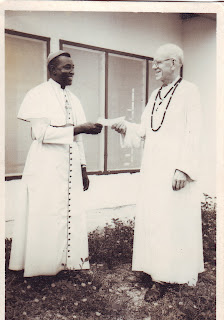Ancestral Musings: Cardinal Dery’s Legacy and the Case against Non-Diocesan Leadership
In 1929, Peter Poreku Dery was about
twelve years old when the Catholic Missionary Fathers of Africa first arrived
in Jirapa, some twenty-two miles distant from Dery’s village (Zemopare), and
began their work of Christian conversion. He was first introduced to the
missionaries by his father who had come into contact with them through his work
as an itinerant trader. His father was so enthusiastic about the missionary
religion to the extent that he was prepared to annul the traditional marriage
between him and four of his wives in order to become a Christian. This act
provoked a serious religious and cultural conflict between Poreku Dery’s father
and his uncle. Ritual sacrifices at the ancestral shrine as well as various
acts of divination failed to reconcile the two brothers but led to a scission
within the family and the emigration of Dery’s father. Poreku Dery assisted in
all these rituals and felt the pain of the conflict and the separation; a
feeling that helped to make him a religious reformer. (Alexis B. Tengan
2013:22)
On the Need for Diocesan Leadership
The basis of the socio-religious organization and
leadership structure of the Dagara is kinship and house-based structure. As an
agricultural people, the lineage emerges as a localized, land-owning group.
Dispersed descent groups are linked by clanship. Authority then is delegated to
the senior living member of the patrilineage, seniority being defined by age
within generation categories. Hence, within the extended family system, it is
the oldest man of the senior generation who becomes the House Senior Elder (Yir-nikpee, plural, Yir-nimbere). He has
charge of maintaining the rules and customs established by the founding ancestors.
The authority of the Senior Elder (Yir-nikpee) is basically spiritual and
religious and he is assisted by all the elders of the senior generation.
Decisions are reached through discussions and informal consensus. The senior
elder and his fellow elders keep the house community together as one family.
However, it should be noted that nothing is done without first consulting the
diviner (Bagr-bogre) to know the opinion of the ancestors concerning the issue
at stake (Linus Zan 2013:
On the Need for Reconciliation:
Throughout his ministry as priest, Bishop and Archbishop and later as
Cardinal, Dery promoted reconciliation whenever it was necessary between
individuals, in families, between different tribes and even at the national
level. I recall how during the celebration of his funeral, Archbishop Philip
Naameh, then Bishop of Damongo, lauded Dery’s capacity to reconcile people and
get couples to regularise their marriage. He noted that not all of them were
successful, but at least the effort was made and it must have borne fruit for
them, their children and the society at large during the time that the
marriages held together. I believe that Dery’s perseverance was rooted in the
call of the Bible for reconciliation part of which is strongly expressed by
Paul in his letters and in those letters attributed to him and which pope
Benedict XVI explored with Bishops and delegates from
Reconciliation Between the Old and New:
It is this attitude to culture that Dery epitomized in
his emblem by the symbols of the house without the cross and one with the
cross. Explaining the two houses in his coat of arms, Dery (2001:87) noted
that:
“A critical observer will notice that the house on the
right has nothing on it whilst the house on the left has a cross. I see my
vocation as bishop as a call, addressed to me by the Lord, to continue the work
of the apostles in building up his family, the new family of the children of
God. But to build up this new family, I am expected to use the old material. As
an apostle of Jesus Christ, I must help transform the old material (...) into
the new people of God. Hence, in my apostolate, I must bear in mind not to
destroy the treasures that are of value in the old house. Rather, I should keep
and use them in the construction of the new family so that the people of the
old house who have to leave certain things that are unacceptable to the Gospel,
will still identify themselves in their new house and feel at home in it.
(Edward B. Tengan 2013: 142)
Not in Need for Perfection in Leadership
The bat was not happy that God made all the winged
creatures to stand or perch on their feet while he (the bat) hangs on his feet
with the head down. He therefore went to complain, and God told him he could
not change what he had made. So the bat said to himself: Since God has punished
me by making me hang with my head down, I will also punish Him whenever I go to
toilet. I will shit on him.” So, every time the bat goes to toilet, he shits
up, believing that he is shitting on God, but the shit falls back on him by the
law of gravity. So, the bat is always smearing himself with his own excreta,
and that is why it has such a strong scent. (Gregory Ebo Kpiebaya 2016:134)




Comments
Post a Comment